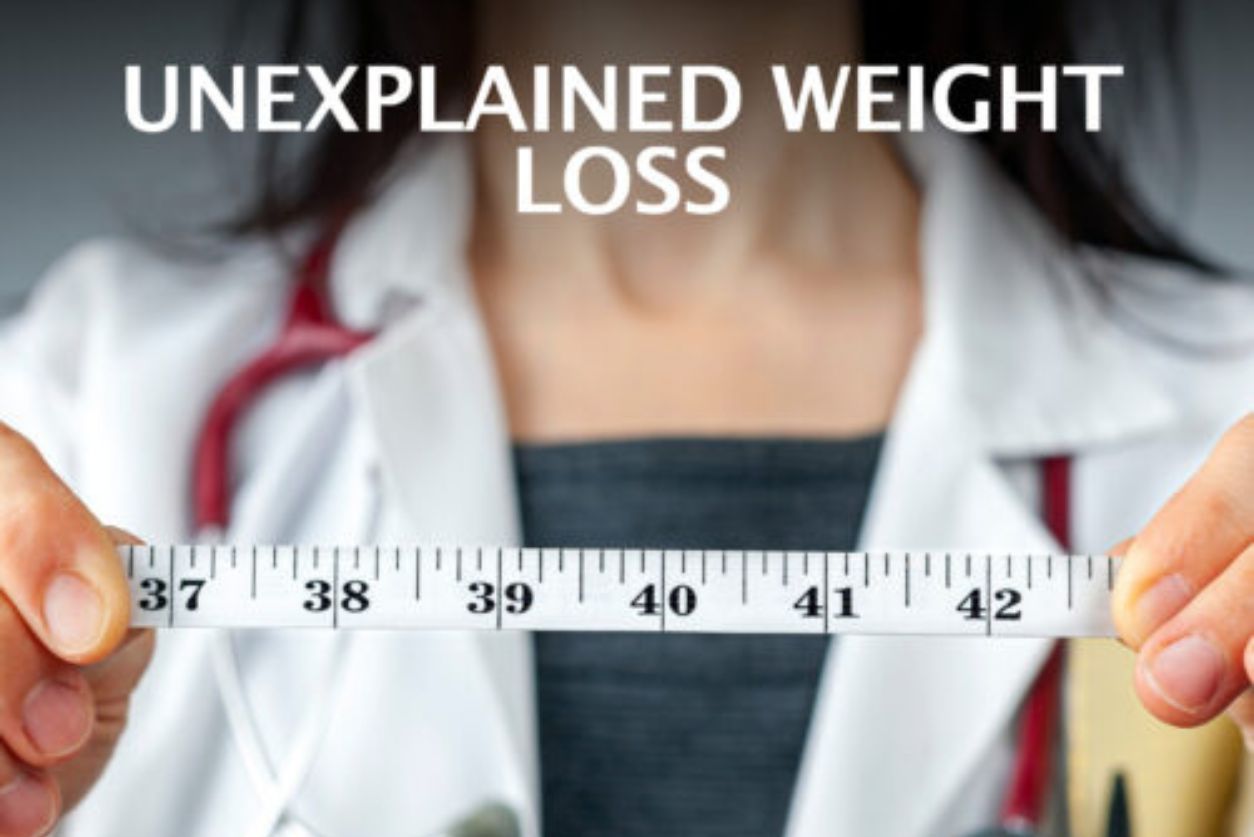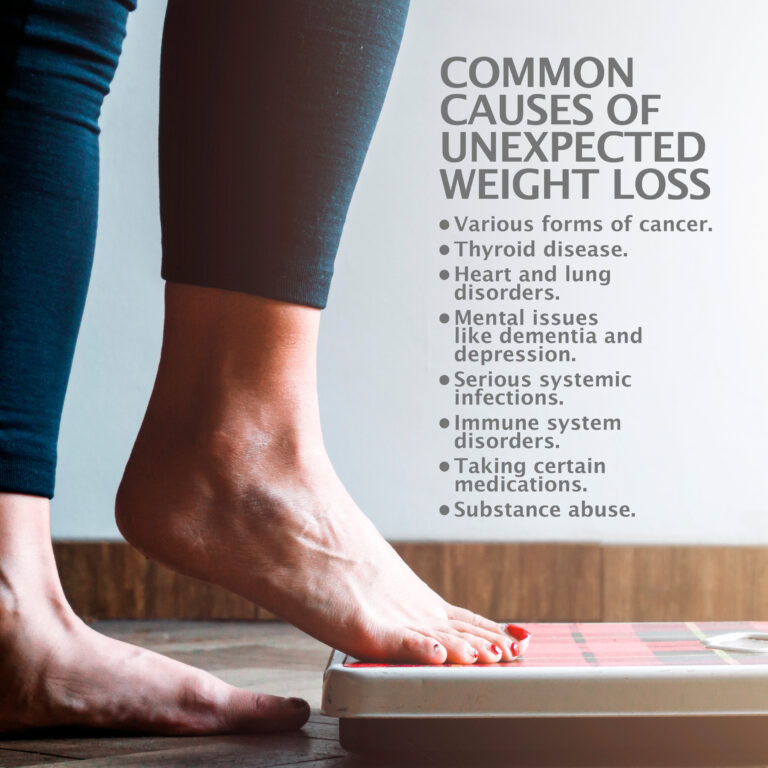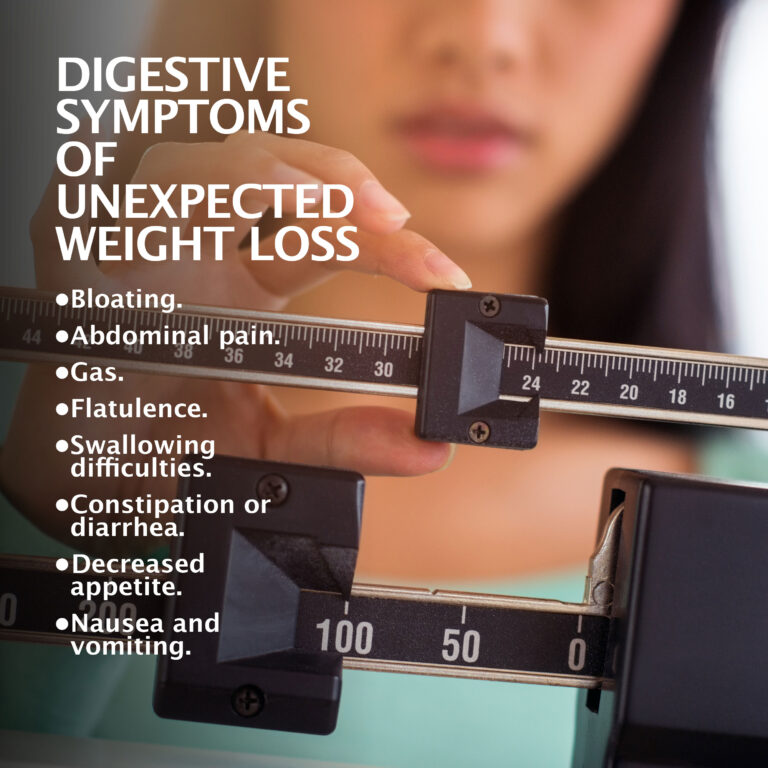
Unexplained Weight Loss
Many symptoms can indicate you are experiencing a health concern. The doctors at Gastroenterology of Greater Orlando stress that one potential red flag you should never ignore is unexplained weight loss.
Overview
Unexplained weight loss is categorized as a measurable decline in body weight when you are not:
- Dieting.
- Consuming fewer calorie-rich foods.
- Exercising more frequently or more intensely.
Participating in any other activity geared towards weight loss.
Specific Numbers
Weight loss is unexplained if you drop at least 10 pounds (or five percent of your body weight) over six months to a year.
Losing even a few pounds here or there without engaging in weight loss efforts is not always normal. Any noticeable decrease in body weight over several weeks to months should be brought to your doctor’s attention as soon as possible and be thoroughly evaluated.
Causes
Unexplained weight loss can have many causes. Often the underlying reasons are a combination of several factors. Though less often, sometimes doctors cannot pinpoint a single cause.
Common causes for unexpected weight loss include:
- Various forms of cancer.
- Thyroid disease.
- Heart and lung disorders.
- Mental issues like dementia and depression.
- Serious systemic infections.
- Immune system disorders.
- Taking certain medications.
- Substance abuse.

Unexplained weight loss can also result from several gastrointestinal problems such as peptic ulcer disease, celiac disease, nutrient absorption struggles, and inflammatory bowel disorders like Crohn’s disease and ulcerative colitis.
Risk Factors
Your risk increases if you:
- Have an underlying yet undiagnosed health problem capable of causing unexplained weight loss.
- Consume excessive quantities of alcohol or other potentially harmful substances.
- Have a dental problem or nutritional deficiency.
- Have been diagnosed with an eating disorder.
Your risk also tends to elevate if you are age 65 or older. Weight loss often indicates more serious issues in the elderly, but all ages can be affected by it.
Accompanying Symptoms
Other symptoms usually go with unexplained weight loss caused by a serious illness. In a large percentage of cases, this can impact the digestive tract by causing:
- Bloating.
- Abdominal pain.
- Gas.
- Flatulence.
- Swallowing difficulties.
- Constipation or diarrhea.
- Decreased appetite.
- Nausea and vomiting.

Other digestive symptoms include loose or painful teeth, swollen salivary glands, difficulty chewing, and dry mouth.
Symptoms unrelated to the digestive tract that can come with unintentional weight loss may include:
- Fatigue.
- Skin inflammation.
- Decreased muscle mass.
- Increased urination.
- Red, irritated eyes.
- Physical pain.
- Insensitivity to hot and cold.
- Numbness or tingling in your fingers and toes.
Some potentially life-threatening symptoms can include:
- Severe abdominal pain.
- Uncontrolled vomiting or diarrhea.
- Blood in the vomit or stool.
- Dizziness.
- Breathing difficulties.
- Mental confusion.
- Severe headache.
- Heart rhythm or rate irregularities.
If you are experiencing any of these life-threatening symptoms, go to a hospital or clinic’s emergency room.
Complications
Weight loss on its own is not deadly. Some of its underlying causes could be fatal or far more difficult to treat if diagnosed later. These complications can be avoided by closely monitoring your weight and having it checked out by a gastroenterologist if you notice any significant changes.
Diagnosis
Unexplained weight loss is a symptom but not a specific illness. The search for a diagnosis is a multi-step process and can be time-consuming.
The diagnostic process occurs over several stages.
Your doctor will ask you questions to better understand the problem during the initial phase. These may include:
- When did your weight begin to decline?
- Have other symptoms accompanied the problem?
- Have your dietary or lifestyle habits have changed?
- Have you experienced or are you currently coping with significant life stresses?
- Are you using any medications?
After this stage, your doctor will perform a complete physical examination where your vitals will be taken. A visual evaluation will likely follow this to spot any possible abnormalities.
The final and longest-lasting examination part is testing. This can include blood tests, hormone panels, and, when necessary, internal imaging tools such as:
- X-Rays.
- MRI, magnetic resonance imaging scans.
- CT, computerized tomography.
Possible Treatment Options
There is no one clear-cut treatment to fix unexplained weight loss.
The therapeutic protocol chosen by your gastroenterologist will depend on several factors, including:
- The specific underlying problem.
- The condition’s severity.
- Your weight.
- Your general health.
- Your age.
- Your physical conditioning level.
- If you are taking certain medications.
More common and less serious incidents might find improvement through weight-boosting efforts such as:
- Consuming More Calories – This sounds simple enough, but it might be challenging if you are dealing with digestive symptoms. Doctors and nutritionists suggest increasing your calorie count by anywhere from 500 to 1,000 calories per day until enough weight is gained back.
- Eat Protein-Laden Products – Doctors and dieticians encourage eating protein-rich foods to reverse unexplained weight loss. Protein is known to help build muscle mass.
- Schedule At Least Three Full Meals Per Day – Doctors recommend eating at least three meals per day if you want to put weight on. This ensures that the body receives a steady stream of nourishment.
- Consume Foods Containing Fats and Carbohydrates – These are notorious for being pound-packing foods. Still, since some of these choices are not always healthy, you should eat them in moderation.
- Increase Your Intake of Energy-Producing Items – Energy-dense foods are known to help you gain weight. Recommended foods include nuts, high-dairy fats (like yogurt, milk, and cheese), grains, meat products, and potatoes.
- Lift Weights – Pumping iron builds muscle mass more than many other types of exercise.
- Limit Water Consumption Before Meals – While water intake is crucial to maintaining optimal health, you should not consume excessive amounts before meals. Doing so can fill you up and limit your ability to ingest enough calories.
- Choose Milk as Your Beverage of Choice – Milk should be your go-to beverage. It contains several essential vitamins and minerals and enough fat and calories to help you gain weight.
- Drink Weight-Gaining Shakes – These beverages are specially formulated to help people maintain healthy weights. Many of these beverages contain large concentrations of protein, carbohydrates, and calories.
- Quit Or Do Not Start Smoking – There are countless reasons why you should not smoke. The habit can often be detrimental to weight gain because cigarettes contain appetite-suppressing chemicals.
- Get Adequate Rest – Sleep is crucial to building enough muscle mass, so you should try to get seven to nine hours each evening.
- Use Larger Plates – This advice might seem silly, but the truth is that you tend to eat more food when you can fit larger quantities onto your plate.
Contact Us
Our practice began more than 15 years ago and has emerged as one of the leading gastroenterology practices in central Florida. We perform several diagnostic procedures using state-of-the-art equipment in a friendly, comfortable, and inviting atmosphere. Patient care is always our top priority. Contact us today